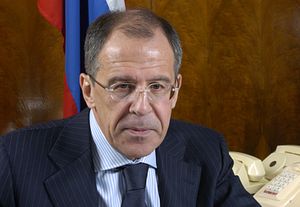In an interview with Channel News Asia television, Russian Foreign Minister Sergey Lavrov attacked the U.S. military rebalance to Asia, including the increased deployment of U.S. naval and ground forces to the Pacific theater of operations, and additionally accused Washington of exaggerating the array of threats in the region, according to TASS.
“The United States is engaged in a very huge military buildup in Asia, including under the pretext of countering the North Korean threat but the scale of the buildup is way beyond the need and disproportionally (sic) huge,” Lavrov said.
The Russian foreign minister also pointed out that the United States is “building missile defense in cooperation with Japan and South Korea, which is not helpful at all.”
He also attacked Washington’s withdrawal from the Anti-Ballistic Missile (ABM) Treaty that limited the number of anti-ballistic missile defense systems against nuclear-armed ballistic missiles:
And the fact that the United States dropped from the ABM Treaty some time ago was a destabilizing factor of global importance. It triggers buildup and brings us back to the mutually assured destruction logic as it relates to the strategic stability.
“Russia does not want any arms race and Russia would not engage in the arms race. We have enough technological means to provide a not very expensive answer to the efforts to build missile defense, especially when the Iranian nuclear issue has been resolved,” he added.
Lavrov’s remarks will find sympathetic ears in Beijing, which, as my colleague Shannon Tiezzi pointed out, is trying to advance a security vision of the Asia-Pacific region in where the United States would presumably play a much smaller role than is the case now. Moscow’s support will be crucial for implementing this vision.
However, whereas Chinese and Russian interests broadly converge when it comes to dealing with Northeast Asian powers such as South Korea and Japan, they diverge in Asia’s Southeast – in particular in the South China Sea.
So far, Russia has refused to back up Chinese claims there since it needs to walk a careful balancing act between not openly opposing Chinese claims in the South China Sea while not exasperating one of its biggest regional customers of military hardware and close partner: Vietnam, a claimant itself (See: “Vietnam Commissions Two New Subs Capable of Attacking China”).
Consequently, Lavrov is a lot less fiery when approached on the South China Sea subject. He merely points out that international law should be the basis for any resolution of the territorial disputes there.
“We are strongly in favor for any dispute in South China Sea, in East China Sea, in any sea for that matter, to be resolved on the basis of the international law, including, first of all, the 1982 Law of the Sea Convention, on the basis of the declaration signed between China and ASEAN [Association of Southeast Asian Nations],” he said when pressed by Channel News Asia.
































